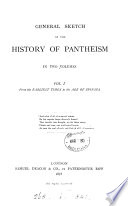 | Henry Thomas Colebrooke - Hinduism - 1837 - 472 pages
...moves transversely. In living beings it is the cause of vice. The third and lowest is darkness (tamas). It is heavy and obstructive ; attended with sorrow,...nature as we do of the trees of " a forest," say the Sanc'hyas.-f In the Vedas they are pronounced to be successive modifications, one of the other : "... | |
 | Henry Thomas Colebrooke - Hinduism - 1837 - 468 pages
...moves transversely. In living beings it is the cause of vice. The third and lowest is darkness (tamas). It is heavy and obstructive ; attended with sorrow,...downwards. In living beings it is the cause of stolidity. 1— These three qualities are not mere accidents of nature, but are of its essence and enter into... | |
 | Asia - 1845 - 574 pages
...third and lowest is darkness, (tamas). It is heavy and obstructive, attended with sorrow, dullness and illusion. In earth and water it predominates,...qualities of nature, as we do of the trees of a forest," says the Sanchyas. many waters appear as a single thing, so by the application of the idea of generality... | |
 | Henry Thomas Colebrooke - Hindu philosophy - 1858 - 338 pages
...moves transversely. In living beings it is the cause of vice. The third and lowest is darkness (lamas). It is heavy and obstructive; attended with sorrow,...nature as we do of the trees of a forest ," say the Sdnc'hyas. * In the Vedas they are pronounced to be successive modifications, one of the other : "All... | |
 | Henry Thomas Colebrooke - Hindu philosophy - 1858 - 364 pages
...moves transversely. In living beings it is the cause of vice. The third and lowest is darkness (lamas). It is heavy and obstructive; attended with sorrow,...it is the cause of stolidity. These three qualities arc not more accidents of nature, but are of its essence and enter into its composition. "We speak... | |
 | Henry Thomas Colebrooke - Hindu philosophy - 1858 - 340 pages
...moves transversely. In living beings it is the cause of vice. The third and lowest is darkness (lamas). It is heavy and obstructive; attended with sorrow, dulness, and illusion. In earth and wator it predominates, wherefore they fall or tend downwards. In living beings it is the cause of stolidity.... | |
 | Henry Thomas Colebrooke - Hinduism - 1873 - 578 pages
...moves transversely. In living beings it is the cause of vice. The third and lowest is darkness (tamas). It is heavy and obstructive; attended with sorrow,...nature, but are of its essence and enter into its composition.2 " We " speak of the qualities of nature as we do of the trees of " a forest," say the... | |
 | Constance E. Plumptre - Pantheism - 1878 - 422 pages
...obstructive, attended with sorrow, dullness and illusion. In living beings it is the cause of stolidity. In earth and water it predominates ; wherefore they fall or tend downwards. These three qualities are considered to be not mere accidents of nature, but are of its essence and... | |
 | Constance E. Plumptre - Pantheism - 1878 - 432 pages
...obstructive, attended with sorrow, dullness and illusion. In living beings it is the cause of stolidity. In earth and water it predominates ; wherefore they fall or tend downwards. These three qualities are considered to be not mere accidents of nature, but are of its essence and... | |
 | Īśvara Kṛṣṇa - 1881 - 180 pages
...however, but the constituent elements of Nature (Prakriti). " These three qualities," says Colebrooke, " are not mere accidents of Nature, but are of its essence and enter into its composition." Nature, or primordial matter, is described in the system of Kapila as formed by the gunas, which were... | |
| |